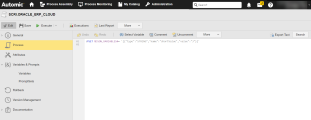Oracle Fusion Cloud ERP Jobs: Submit BICC Request
Automic Automation Submit BICC Request Jobs allow you to run and monitor the Oracle BICC (Business Intelligence Cloud Connector) ESS Job on your Oracle Fusion Cloud Enterprise Resource Planning application from Automic Automation where BICC allows you to extract business data from a data source and load it into configured external storage.
Oracle Business Intelligence Cloud Connector (BICC) is a tool that can be used to extract data from Oracle Fusion Cloud and load it into a data warehouse. Oracle Enterprise Scheduler (ESS) is a tool that allows you to schedule jobs to run at specific intervals.
To start an integration successfully, you have to define all the relevant parameters. Optionally, you can also define other properties and parameters that you want to pass to the integration in JSON format.
This page includes the following:
Defining Oracle Fusion Cloud ERP Submit BICC Request Job Parameters
On the ESS Submit BICC Request page, you define the parameters relevant to submit the Submit BICC Request job to your Oracle Fusion Cloud ERP environment.
-
Connection
Select the Oracle Fusion Cloud ERP Connection object containing the relevant information to connect to the application.
To search for a Connection object, start typing its name to limit the list of the objects that match your input.
-
Application Name
The name of the application where the job is defined.
-
Package Name
The name of the package where job is defined.
-
Job Type
The job type definition:
-
JOB_DEFINITION (default)
-
JOB_SET
-
-
Job Definition Name
The Job definition name to submit.
-
Description
(Optional) The description of this request. The value is displayed in the Oracle UI in the Submission Notes field.
-
Parameters Input Type
Allows you to pass arguments created at runtime to Oracle Fusion Cloud ERP in JSON format.
Select one of the options available:
-
None (default)
Select this option if you do not want to pass any parameters to Oracle Fusion Cloud ERP.
-
JSON
Use the JSON field to enter the JSON payload definition.
Important!There are many options available to define the JSON payload. For more information and examples of the JSON definition, see Defining the JSON.
-
JSON File Path
Use the JSON File Path field to define the path to the JSON file containing the attributes that you want to pass to the application. Make sure that the file is available on the Agent machine (host).
-
-
Enable Request ID Directory
Check this box to open the Download File Parameters field and decide whether you want to define the specific permission details.
The Pre-Process page allows you to define the settings of the Jobs using script statements. These statements are processed before the job is executed, see Oracle Fusion Cloud ERP Jobs: Setting Properties Through Scripts.
Download File Parameters
This panel is only visible if you have enabled the Download Execution Details box.
You can define the following download permission details for the file that should be downloaded:
-
Download Directory
The given directory for the downloaded execution details. For example: C:\Documents.
Tip:Downloaded files will also be visible in the AWI Job Reports section for the corresponding job (select Directory) where you can download them directly from the AWI.
Note:The system will attempt to create a download directory if one does not already exist. Once the directory is created, it will download the reports into it.
-
File Permission
(Optional) Here, you can set the user's permissions on the file.
-
Windows
-
RWX
-
RW
-
R
-
W
-
X
-
-
Unix (follows the CHMOD format)
-
0 = ---
-
1 = --x
-
2 = -w-
-
3 = -wx
-
4 = r-
-
5 = r-x
-
6 = rw-
-
7 = rwx
-
-
-
File Owner
(Optional) You can set the file owner here. You can use various formats. For example:
Windows: automic
Unix: root
-
File Owner Group
(Optional) Set a file owner group here, such as root, automic, etc.
Defining the JSON
This section gives you examples of how you could define the JSON field when defining a Submit BICC Request Job. You have different options available.
Simple JSON Definition
The first option to define the JSON field is a simple payload definition. To do so, make sure you define the parameters that you want to pass to Oracle Fusion Cloud ERP.
Example
{
"parameters": [
{
"type":"STRING",
"name":"shortValue",
"value":"3"
}
]
}
Using Variables
You can also use variables in the payload definition.
Example
In the JSON field, enter the following:
&JSON_VARIABLES#
If the variable is not defined yet, you must define it now. You do it on the Variables page of the Submit BICC Request Job definition:
(Click to expand)
When you execute the Job, the variables will be replaced with the value you have just defined. This is visible in the Agent log (PLOG), see Monitoring Oracle Fusion Cloud ERP Jobs.
Submit BICC Request Job in a Workflow
You can also use the JSON field if you want to include a Submit BICC Request Job in a Workflow and you want to use Automation Engine variables in it.
Example
In the Workflow, a Script object (SCRI) with the variable definition relevant for said value and time precedes your Submit BICC Request Job:
(Click to expand)
In the Submit BICC Request Job, the JSON definition includes those variables:
(Click to expand)
When the Job is executed, the variables will be replaced with the value you have just defined. This is visible in the Agent log (PLOG), see Monitoring Oracle Fusion Cloud ERP Jobs.
See also:


